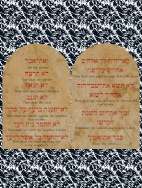The First Commandment
Exodus 20:4–5
Thou shalt not make for thee a carved image, nor any figure of that which is in the heavens above, or that which is in the earth beneath, or that which is in the waters under the earth; thou shalt not bow thyself down to them, nor serve them...
True Christian Religion 291. ...In the sense nearest the letter this commandment means that idols must not be worshiped...
TCR 292. This commandment... also means in the natural sense, that no man dead or living should be worshiped as a god....
TCR 293. In the natural sense, which is the sense of the letter, this commandment means also that no one except God, and nothing but what proceeds from God, is to be loved above all things. This also agrees with the Lord’s words (Matt. 22:35–37; Luke 10:25–28). For any person or thing that is loved above all things is God and is Divine to the one who so loves. For example, to one who loves himself or the world above all things, himself or the world is his God; and this is why such people do not in heart acknowledge any God, and in consequence are conjoined with their like in hell, where all who love themselves and the world above all things are gathered.
TCR 294. The spiritual sense of this commandment is that no other God than the Lord Jesus Christ is to be worshiped, because He is Jehovah, who came into the world and accomplished the work of redemption, without which neither any man nor any angel could have been saved. That there is no God beside Him, is evident from the following passages in the Word:
It shall be said in that day, Lo, this is our God; we have waited for Him that He may deliver us; this is Jehovah; we have waited for Him; we will rejoice and be glad in His salvation (Isa. 25:9) ....
Philip said to Jesus, Lord, show us the Father. Jesus said to him, He who sees Me sees the Father. Believest thou not that I am in the Father, and the Father in Me? (John 14:8–10).
In Jesus Christ dwells all the fullness of Divinity bodily (Col. 2:9) ....
From these passages it is very evident that the Lord our Savior is Jehovah Himself, who is at once Creator, Redeemer, and Regenerator. This is the spiritual sense of this commandment.
TCR 295. The celestial sense of this commandment is that Jehovah the Lord is infinite, unmeasurable, and eternal; that He is omnipotent, omniscient, and omnipresent; that He is the First and the Last, the Beginning and the End, who was, is, and is to be; that He is love itself and wisdom itself, or good itself and truth itself, consequently life itself; and thus the one only Being, from whom all things are.
TCR 296. All who acknowledge and worship any other God than the Lord the Savior, Jesus Christ, who is Jehovah God Himself in human form, sin against this first commandment....
TCR 296:4. Who would not see the monstrosity of that faith if it were presented as it is in itself in a picture before his eyes? For example, if the three were to stand in order beside each other, the first distinguished by a scepter and crown; the second holding a book, which is the Word, in his right hand, and in his left a golden cross spattered with blood; the third, encircled with wings, standing on one foot, ready to fly forth and do his work, and above the three the inscription, “These three persons, being so many Gods, are one God.” What wise man seeing the picture would not say to himself, “Alas, what hallucination!”
But he would say otherwise if he were to see a picture of one Divine Person with rays of heavenly light about His Head and with the inscription over it, “This is our God, at once Creator, Redeemer, and Regenerator, and therefore the Savior.” Would not that wise man kiss this picture, carry it home in his bosom, and by the sight of it gladden his own mind, and the minds of his wife and his children and servants?
Questions and Thoughts for Reflection
- In TCR 293, what is the meaning of “other gods”? How can we tell how we might be worshiping such other gods?
- Perhaps fears might be one of the ways we can spot other gods; for example, being fearful of losing money, or of losing reputation with certain people. Another clue is thinking about what things we most enjoy; or about what we would do if nobody could ever find out. These clues can help us get rid of our spiritual idolatry and instead let the Lord be our King.
- If we look at TCR 295, what are some ways in which we are a bit shaky in acknowledging these key characteristics of the Lord God? For example, are we sometimes doubtful about His providence, His power or His love?
- Do you have a clear enough mental picture of the one God to gladden your mind?
| previous |  |
next |
|---|


